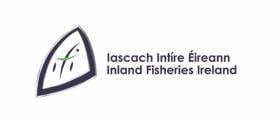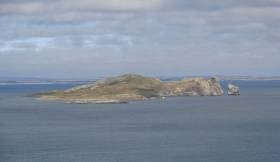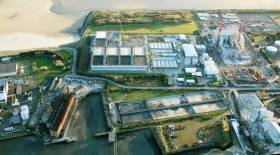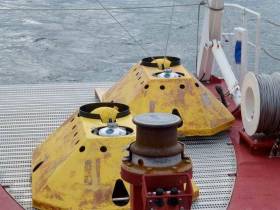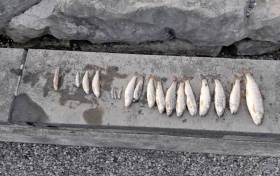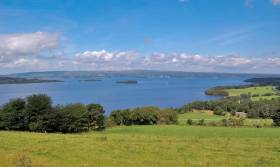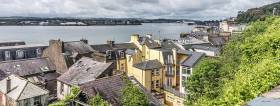Displaying items by tag: Irish Water
Inland Fisheries Ireland (IFI) has prosecuted Irish Water for two separate pollution incidents which occurred in Cavan last summer.
On Thursday 6 June, Judge McLoughlin twice convicted Irish Water at Cavan District Court under the Fisheries (Consolidation) Act 1959 for allowing harmful substances to enter the water on two occasions in June last year.
Over 600 fish were killed as a result of one pollution incident while an important habitat for spawning and young fish was damaged as a result of the other.
The court heard evidence from fisheries inspector Cormac Goulding that on 19 June 2018, staff from IFI noticed that the river downstream of the Ballinagh Treatment Plant in Cavan was in very poor condition.
The water was cloudy and the river was covered in sewage fungus and algal growth.
Following an investigation, it was discovered that untreated sewage was being discharged from the water treatment plant and at the pumping station further downstream.
Irish Water issued a report to IFI in response to the prosecution which revealed that their computerised monitoring system had been offline for six days, which meant that no alerts had been received about the problem.
The effluent was being discharged into aquatic habitat suitable for spawning or young trout.
Judge McLoughlin fined Irish Water €3,000 and total costs of €4,679 were awarded to IFI.
A separate pollution incident occurred a few days later on 25 June 2018 in Cavan Town River.
Judge McLoughlin heard evidence from Ailish Keane, senior environmental fisheries officer at IFI, about how the pollution incident resulted in the death of hundreds of fish including 687 native brown trout.
An investigation found that the fish kill was caused by the release of sewage effluent into the river from an overflow culvert located under Farnham Street Bridge.
Irish Water were again convicted and fined €4,000 plus costs of €4,346.
Milton Matthews, director of the North Western River Basin District at IFI, said: “In both cases in Cavan, harmful material was discharged into local rivers and in Cavan town this resulted in a large kill of over 600 native brown trout, of all age classes.
“As it can take years for a waterbody to recover to its former condition following pollution incidents, it is crucial that robust management systems are in place to prevent avoidable incidents which can have a serious impact on our wild fish and their natural habitat.
“The restoration of the aquatic habitat and the maintenance of water quality is vital if we are to enable wild fish populations to recover naturally.
“We are working to protect, conserve and develop our natural fisheries resource which is of significant recreational and economic value to communities in Cavan and across the country.”
Irish Wastewater Schemes Fall Foul Of European Court of Justice
Almost 30 sewage schemes across Ireland fall short of EU directives on wastewater treatment, as The Green News reports.
The European Court of Justice ruling from this past Thursday 28 March now means Ireland could be liable to significant fines if the problem schemes are not addressed.
Among the court’s findings were that Cork city’s strained wastewater treatment scheme was subject to more than 800 spillages of untreated sewage in 2015 alone.
Sensitive areas in Killarney, Longford, Dundalk and Tralee, among others, were also affected by untreated wastewater discharges for which the State has been reprimanded by European judges.
In addition, the State as found guilty of failing to provide for secondary treatment at a number of problem sites including Cobh in Cork Harbour, the fishing harbours of Arklow and Killybegs, and Ringsend in Dublin — the latter of which was the scene of a discharge of ‘activated sludge’ only a month ago.
The Department of Housing and Local Government says it has provided Irish Water “with the necessary resources to both tackle the deficiencies identified by the [ECJ] as well as providing the infrastructure which will underpin the future sustainable development of our country.”
Part of the State’s defence in this case were occasions of ‘unusually heavy rainfall’ that overwhelmed the country’s wastewater management systems.
Such conditions are also linked to the leeching of nitrates and phosphates from agricultural sites causing seaweed blooms in coastal areas, as highlighted by a recent academic report.
The news also comes after oral hearings began into a long-planned €500 million wastewater treatment scheme for North Dublin that faces strong local oppositions.
The Green News has more on the story HERE.
Planning Hearing On Clonshaugh Wastewater Plant Gets Under Way
Planners are from today set to review proposals for a controversial €500 million wastewater treatment scheme in North Dublin, as The Irish Times reports.
Clonshaugh near Dublin Airport was chosen in June 2013 as the site for the sewage ‘super plant’ before Irish Water took over the Greater Dublin Drainage project from Fingal County Council last year.
The new plant — second only to the Ringsend wastewater facility in scope — would be connected to a new orbital sewer to Blanchardstown, and an outfall pipe to eject treated wastewater in the sea north of Ireland’s Eye.
Plans for the new sewage processing plant have faced strong local opposition, both from residents adjacent to the Clonshaugh site and connected works and marine professionals concerned about potential environmental risks.
Last October, Howth-based ferryman Ken Doyle expressed his fears of the knock-on effect on fish stocks from any accidental contamination of the local waters from the outfall pipe.
The planning hearing began at The Gresham hotel in Dublin this morning, and The Irish Times has more on the story HERE.
EPA Investigates Wastewater Discharge In River Liffey
This past weekend’s discharge of wastewater in the River Liffey from the Irish Water treatment plant in Ringsend is being investigated by the Environmental Protection Agency.
As RTÉ News reports, failure of a processing tank at the locally controversial site led to the overflow, which Irish Water confirmed was from an outfall 1km from the plant in the Lower Liffey Estuary in Dublin Bay, around 9am on Saturday (23 February).
Irish Water says the discharge of ‘activated sludge’ — which “does not pose the same risk to public health or the environment as a raw sewage discharge would” — lasted for around 20 minutes.
But drone images captured on Saturday evening showed the persistence and extent of the pollution incident beside the Great South Wall.
The Ringsend wastewater treatment plant is reportedly running at 20% above capacity as it treats two-fifths of all wastewater in Ireland.
As such, its standard discharge “does not comply with the Urban Wastewater Treatment requirements”, according to an Irish Water statement which also confirmed that the EPA conducted an audit of the affected site yesterday (Tuesday 26 February).
Acoustic Doppler Current Profilers Deployed In Lough Swilly
The Department of Transport, Tourism and Sport (DTTAS) advises that TechWorks Marine has deployed four trawl-resistant, bottom-mounted Acoustic Doppler Current Profilers (ADCPs) frames throughout Lough Swilly.
The frames deployed on Wednesday 20 February will be on the seafloor for a minimum period of one calendar month and a maximum period of two months (weather permitting).
Water sampling surveys are required to be carried out at the same time as the deployments and these are tide and weather dependent, and may cause a slight delay in recovery, hence the two-month deployment period.
The ADCPs will be measuring currents through the water column at each location over the month-long deployment. This data will be used to validate a hydrodynamic model of the area being developed for Irish Water.
The deployment locations as noted in Marine Notice No 5 of 2019 are (degrees, minutes, seconds) WGS84 as follows:
- ADCP 1: 55° 12' 59.5" N, 7° 34' 37.2" W
- ADCP 2: 55° 06' 51.9" N, 7° 29' 02.7" W
- ADCP 3: 55° 03' 52.4" N, 7° 32' 11.3" W
- ADCP 4: 55° 01' 17.5" N, 7° 32' 55.4" W
Each frame will have an ADCP sensor (for waves and currents), acoustic release, rigid recovery buoy, acoustic pinger and grapple line. The frames are approximately 1m2 and will remain on the seafloor for a period of up to 30 days, after which the frame will be retrieved by the acoustic release by the retrieval team of a pop-up buoy allowing for its recovery or by a grapple line recovery method.
During the extent of the deployment, ADCP frames 1, 2 and 3 will have a surface marker. The ADCP 1 and 2 will have a red in colour surface buoy and ADCP 3 will have a yellow in colour surface buoy. There will be no surface marker for ADCP 4 so vessel traffic will not need to avoid its location but should be aware of its presence.
Irish Water Prosecuted Over Fish Kill In Tipperary
#FishKill - Inland Fisheries Ireland (IFI) prosecuted Irish Water yesterday (Tuesday 5 February) at Ballina District Court for the discharge of a harmful substance into the Ballycorrigan River on 17 May last year, causing a fish kill.
Among the fish mortalities were 100 brown trout of different age groups, three juvenile salmon and one stone loach which were killed when a cleaning substance was discharged into the river.
Judge Patrick Durcan heard evidence from Michael Fitzsimons, a senior fisheries environmental officer with IFI, that a detailed investigation was carried out following a pollution report received from the general public.
It found that the fish kill was caused by a combination of effluents arising from an uncontrolled maintenance event from Irish Water’s Ballina/Killaloe wastewater treatment plant.
Irish Water entered a guilty plea. Judge Durcan directed Irish Water to pay IFI’s legal costs of €2,290 and fined the body €2,500.
Judge Durcan stated that Irish Water did not take into consideration the environment and conditions when discharging into the river and that Ireland’s rivers are its most important natural resource.
He said that while these resources are maintained under the vigilance of Inland IFI, Irish Water needs to be vigilant, too.
Amanda Mooney, director of the Shannon River Basin District with IFI, said: “Irish Water co-operated fully with Inland Fisheries Ireland’s investigation and updated its cleaning protocols for the use of chemicals in treatment plants nationwide with more appropriate methods now in use as a direct result of this incident.
“Our fisheries resource is an extremely valuable asset, both from a recreational and economic perspective and it is crucial that we continue to protect and conserve it for future generations to enjoy.”
#Angling - RTÉ News reports on concerns among anglers on Lough Derg over Irish Water’s plans to pump water from the River Shannon to supply Dublin and the Midlands.
The utility has proposed a pipeline from Parteen Basin, south of Lough Derg, to the capital in order to deal with water shortages due to leaks in the ageing infrastructure.
But the plan has come under fire from campaign groups, who claim the case for such a project is backed by “false statements and mathematical errors”.
And anglers are also fearing the worst over the scheme that would see 330 million litres pumped each day from the Shannon.
Citing difficulties experienced last summer when levels dropped by as much as two feet after a water release by the ESB at Ardnacrusha, Lough Derg anglers’ representative Joe O’Donoghue says the potential harm to boating and the Shannon ecosystem have not been taken into consideration.
#Angling - At a sitting of Ardee District Court on Monday 12 March, Irish Water pleaded guilty to the discharge of deleterious matter to the River Dee on 15 May 2017.
The offence related to a poor quality discharge from a wastewater treatment plant at Ardee, Co Louth.
The River Dee rises near Bailieboro in Co Cavan and flows through Co Meath and Co Louth, where it enters the Irish Sea at the village of Annagassan.
Michaela Kirrane, senior fisheries environmental officer with Inland Fisheries Ireland (IFI), told Judge Coughlan that during a routine inspection of the river on the 25 May last year, it was noted that the river appeared to be in a poor condition downstream of the discharge point from Ardee Wastewater Treatment Plant.
A series of water samples were taken and analysis confirmed that the discharge from the treatment plant was having a deleterious impact on the quality of the River Dee, an important brown trout fishery.
Irish Water co-operated fully with IFI’s investigation and remediation works were carried out. Upgrade works are currently underway to increase capacity at the wastewater treatment plant.
Irish Water was fined €4,500 with costs and expenses awarded to IFI amounting to €4,381.61.
Irish Water Prosecuted Over Lime Discharge & Fish Kill In River Varty
#FishKill - Irish Water pleaded guilty to the discharge of deleterious matter to the River Vartry one year ago, at a sitting of Bray District Court this past Tuesday (20 February).
The offence related to the accidental discharge of lime from their water treatment facility at Roundwood, Co Wicklow.
Roisin O’Callaghan, fisheries environmental officer with Inland Fisheries Ireland (IFI), told Judge Kennedy that, on 21 February 2017, IFI received a call that there had been an accidental spill of lime at the water treatment plant.
On investigation, O’Callaghan confirmed that the spill had resulted in a fish kill for approximately 500 metres downstream from the discharge.
A series of water samples were taken and analysis confirmed that the lime spill had altered the pH in the receiving water, resulting in the death of approximately 100 fish.
Irish Water co-operated fully with IFI’s investigation and initiated an immediate clean-up of the site.
Eoghan Cole BL, representing Irish Water, stated that following the clean-up, the Environmental Protection Agency had completed a dye survey on the drainage network to confirm that only clean surface water was discharging to the River Vartry.
Judge Kennedy commented on the significance of the River Vartry in supporting Atlantic salmon, sea trout, brown trout and lamprey.
Irish Water were fined €500 with costs and expenses amounting to €6,937.65.
#CorkHarbour - Some 35,000 wheelie bins’ worth of raw sewage is being discharged into Cork Harbour every day, Housing Minister Simon Coveney has told the Dáil.
But as The Irish Times reports, the minister has promised that the problem will be fixed within the next 18 months by Irish Water as part of a €100 million wastewater scheme for the region.
More than three years ago, Afloat.ie reported that untreated waste was flowing into open water from communities around Cork Harbour as they awaited new sewage facilities.
Crosshaven, Carrigaline, Ringaskiddy, Passage West and Cobh were cited among those towns and areas that continue to discharge raw sewage through a number of outflows into the harbour.
“There is a lot to do here,” said Minister Coveney in reference to Cork Harbour as well as other group water schemes throughout the country, which have a funding package signed off by all relevant bodies.
Responding to Dáil questions regarding the financing of Irish Water’s capital programme, the minister said the Government was committed to keeping Irish Water as a single national and publicly owned utility that “can achieve many of the more national strategic goals that need to be attained around water that individual local authorities on their own could not do.”
The Irish Times has more on the story HERE.


























